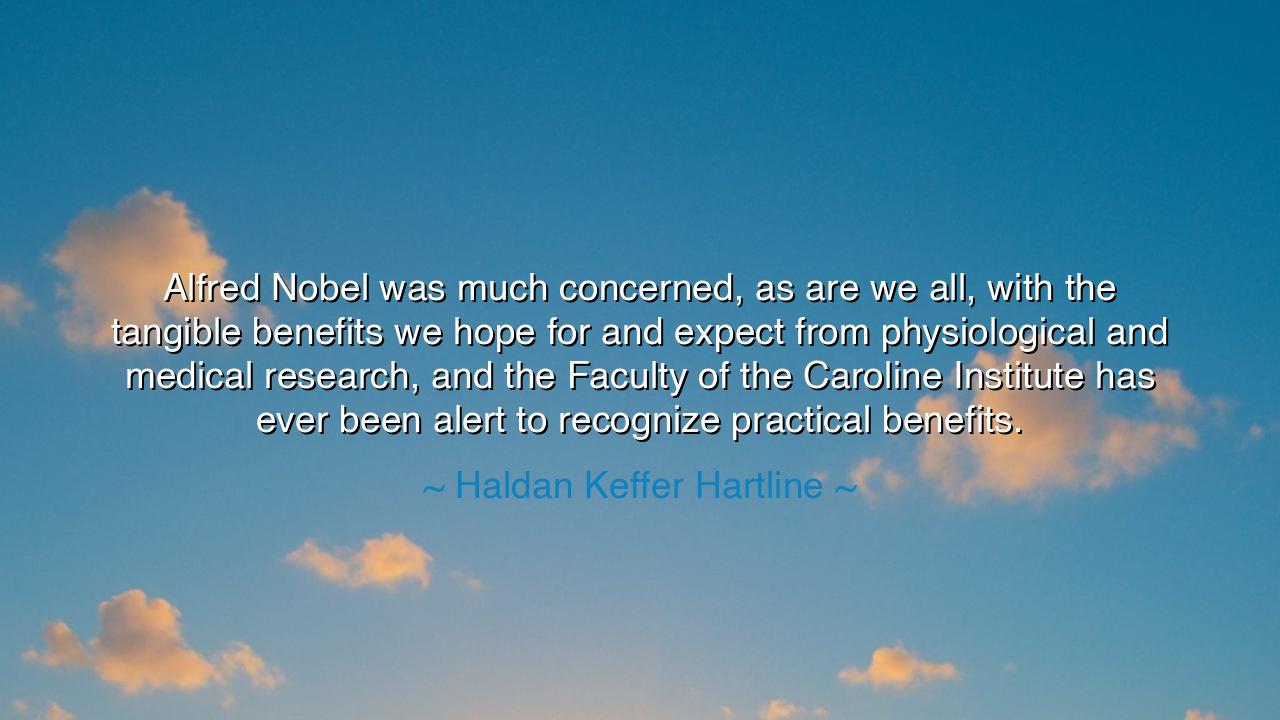
Alfred Nobel was much concerned, as are we all, with the tangible
Alfred Nobel was much concerned, as are we all, with the tangible benefits we hope for and expect from physiological and medical research, and the Faculty of the Caroline Institute has ever been alert to recognize practical benefits.






Hear the voice of Haldan Keffer Hartline, a man of science and Nobel laureate himself, who declared: “Alfred Nobel was much concerned, as are we all, with the tangible benefits we hope for and expect from physiological and medical research, and the Faculty of the Caroline Institute has ever been alert to recognize practical benefits.” In this statement, he reminds us that the pursuit of knowledge is not a vanity, not an idle play of the mind, but a labor meant to bear tangible benefits for humankind. Knowledge that heals, knowledge that sustains, knowledge that lifts humanity from suffering—this was the vision of Alfred Nobel, and it remains the charge of those who inherit his legacy.
The meaning is clear: science, and especially medical research, is not only the exploration of mysteries, but the crafting of tools to aid the human condition. Nobel, though remembered by many for the invention of dynamite, desired above all to leave behind a legacy of peace, of advancement, of discoveries that would strengthen the fragile thread of life. To this end, the prizes that bear his name honor not speculation for its own sake, but work that manifests in practical benefits—cures, treatments, and insights that touch the daily lives of all people.
Consider the story of Alexander Fleming, who by chance and by vigilance discovered penicillin. Had his curiosity ended at observation, his work might have been forgotten. But because his discovery was nurtured, tested, and shared, it blossomed into a weapon against death itself, saving millions from infections that once claimed lives with ease. Here is the truth Hartline speaks of: that research, when guided by purpose, yields fruits that endure for generations. Fleming’s mold, humble and unnoticed at first, became the cornerstone of modern medicine.
So too did the Faculty of the Caroline Institute, entrusted with the awarding of the Nobel Prize in Physiology or Medicine, carry this torch of discernment. They were called not only to honor brilliance, but to honor that which bore fruit in the world. It was not the grandest theory or the most dazzling hypothesis that earned recognition, but the work that touched the sickbed, the operating room, the lives of children, elders, and families across the earth. This vigilance to honor what is useful is what Hartline praises, for it ensures that science remains wedded to service.
The origin of the quote lies in Hartline’s own moment of recognition. When he accepted his Nobel Prize for his studies of the visual process, he understood that his honor was not merely for exploring the mysteries of the eye, but for contributing to a body of work that one day might aid the blind, improve treatments, and illuminate the pathways of sight. His words are therefore both humble and instructive: science is not for the scientist alone, but for all who suffer and hope.
The lesson, then, is this: knowledge without purpose is a candle left unlit. But when knowledge is harnessed for the benefit of humanity, it becomes a beacon. Let no researcher labor for pride alone; let no discovery rest idle in journals while lives hang in the balance. The true nobility of science is measured in the good it bestows upon the world. And the true glory of those who receive its laurels is to remember that their work is part of a covenant with humanity.
Therefore, child of tomorrow, take this teaching into your own path. Whether you labor in science, in craft, in art, or in service, ask always: what tangible benefit does my work bring to others? Does it ease their burdens, heal their wounds, enrich their spirit? If the answer is yes, then your labor is not in vain. Support the work of researchers, honor those who dedicate themselves to service, and remember always that the light of knowledge shines brightest when it is turned outward to warm the world.
Thus the words of Haldan Keffer Hartline endure, echoing the will of Alfred Nobel himself: let science serve life, let research yield healing, let knowledge become compassion in action. And so may the flame of discovery burn not in isolation, but as a gift passed from hand to hand, from age to age, for the betterment of all humankind.






AAdministratorAdministrator
Welcome, honored guests. Please leave a comment, we will respond soon